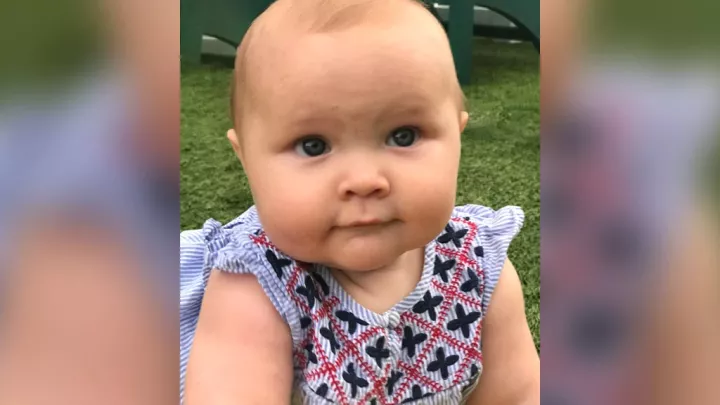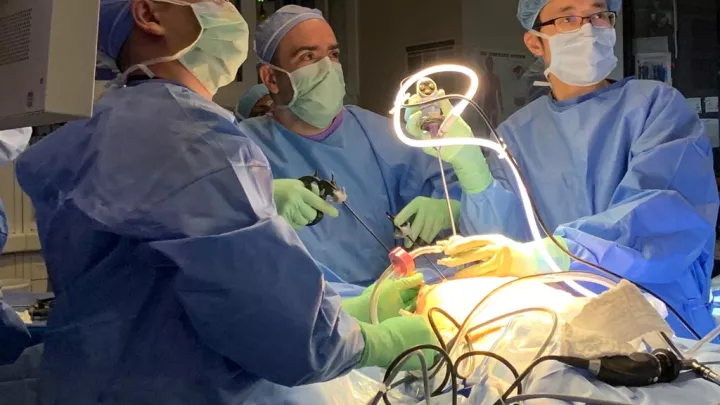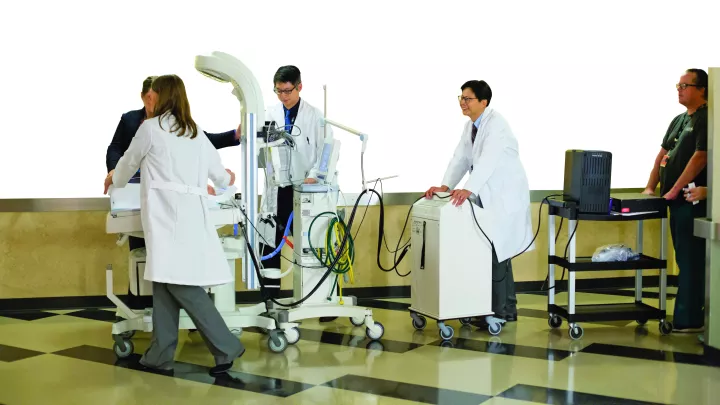
Tai-Wei Wu, MD
Dr. Tai-Wei Wu is an attending neonatologist and Director of Neonatal Neuroprotection Program at Children’s Hospital Los Angeles. He completed his Pediatric Residency training at Cincinnati Children's Hospital Medical Center and Perinatal-Neonatal Medicine Fellowship training at LAC+USC Medical Center and Children's Hospital Los Angeles. His research interest is in the area of neonatal brain injury and hemodynamics. Dr. Wu studies complex hemodynamic changes in newborns undergoing therapeutic hypothermia for hypoxic-ischemic encephalopathy (HIE) by comprehensive bedside monitoring, including point of care ultrasounds, continuous cardiac output monitoring, and end-organ oxygenation. His understanding of cerebral blood flow and metabolism coupling is further enhanced by magnetic resonance (MR) spectroscopy, which measures cerebral metabolites and temperature non-invasively. Uniquely, he has developed a transport protocol to safely conduct MR studies during therapeutic hypothermia by active cooling. MR spectroscopy is obtained both during and after therapeutic hypothermia, allowing for comparison of cerebral metabolic changes in relation to core temperature modulation. His ultimate goal is to identify modifiable factors in the neonatal intensive care setting that will improve neurological outcomes of infants with brain injury. Dr. Wu has numerous peer-reviewed publications in the field of neonatal hemodynamics and newborn asphyxia. He is also the author of several book chapters and invited reviews and a reviewer for notable journals in the field. He is currently the co-investigator of a NIH funded national multi-center trial for the use of erythropoietin in newborn asphyxia.
Dr. Wu’s interest is in the field of Neonatology, with a specific focus in improving neurodevelopmental outcomes of critically ill infants. In term infants, hypoxic-ischemic encephalopathy (HIE) can lead to cerebral palsy and poor neurodevelopmental outcome. Currently, Dr. Wu is interested in optimizing a therapeutic modality of HIE, which is therapeutic hypothermia. In collaboration with the Department of Radiology, in-vivo MR spectroscopy (MRS) is utilized to obtain important biochemical and physical properties of brains of infants suffering from HIE. One such physical property that is of particular interest is brain temperature. The goal is to understand and clarify the relationship between regional brain temperature abnormalities and neurological outcome in the injured brain. Ultimately, this could provide evidence for individualizing hypothermia therapy, instead of the currently employed method of applying one temperature target for all injury types and severities.
Education
Medical School: St. Luke's College of Medicine
Exchange Clerkship: Harvard Medical School
Cincinnati Children's Hospital Medical Center
LAC+USC Medical Center & Children's Hospital Los Angeles
Accomplishments
Pediatric Neonatology, American Board of Pediatrics, Neonatal Resuscitation Program
Society of Pediatric Research
American Academy of Pediatrics
Western Society of Pediatric Research
American Heart Association
Newborn Brain Society
Taiwan Pediatric Association
Taiwan Society of Neonatology
Asian Society of Pediatric Research
International Society of Magnetic Resonance Medicine
Chen-Jiong Lin Young Scientist Award
Young Investigator Pediatric Research Award
Mead Johnson Nutrition Junior Faculty Travel Award - WSPR
Southern California Rising Stars
NINDS- NIH, Co-investigator
Publications
Wu TW, McLean C, Friedlich P, Grimm J, Bluml S, Seri I. Maintenance of whole-body therapeutic hypothermia during patient transport and magnetic resonance imaging. Pediatr Radiol. 2014 May;44(5):613-7. doi: 10.1007/s00247-013-2863-2. Epub 2014
Wu TW, McLean C, Friedlich P, Wisnowski J, Grimm J, Panigrahy A, Bluml S, Seri I. Brain temperature in neonates with hypoxic-ischemic encephalopathy during therapeutic hypothermia. J Pediatr. 2014 Dec;165(6):1129-34. doi: 10.1016/j.jpeds.2014.07.022.
Wisnowski JL, Wu TW, Reitman AJ, McLean C, Friedlich P, Vanderbilt D, Ho E, Nelson MD, Panigrahy A, Bluml S, The effects of therapeutic hypothermia on cerebral metabolism in neonates with hypoxic-ischemic encephalopathy: An in vivo 1H-MR spectroscopy study. Journal of Cerebral Blood Flow and Metabolism. 36(6):1075-86, 2016. PMID:26661180
Wu TW, Tamrazi B, Soleymani S, Seri I, Noori S, Hemodynamic changes during rewarming phase of whole-body hypothermia therapy in neonates with hypoxic-ischemic encephalopathy, Journal of Pediatrics, May 2018, PMID: 29571928
Wu TW, Tamrazi B, Hsu KH, Ho E, Reitman A, Borzage M, Bluml S, Wisnowski L, Cerebral lactate concentration in neonatal hypoxic-ischemic encephalopathy: in relation to time, characteristic of injury, and serum lactate concentration, Frontiers in Neurology, May 2018, PMID: 29867713
Research
Neonatal hemodynamics
Neonatal shock
Therapeutic Hypothermia
Neonatal Encephalopathy
Brain Temperature
Infant Neuroimaging
Research Overview
Dr. Wu studies the effects of whole-body cooling on brain temperature in infants who show evidence of brain injury upon birth. Interestingly, the brain temperature remains higher than expected in patients with more severe brain injury. This study is now being followed by an ongoing effort to characterize the association of elevated regional brain temperature and infants’ neurodevelopmental outcome. At CHLA, we have implemented a safe protocol to perform early neuroimaging for such patients.
In addition, Dr. Wu studies the changes in blood flow of infants who are hospitalized in the critical care unit. Blood flow to organs may be altered in the setting of disease, mechanical ventilation, medications, or even changes in body position. The study of blood flow can be further specified as end organ (such as cerebral blood flow) or systemic blood flow. Maintaining adequate organ perfusion is crucial for cellular functions of gas exchange, energy production, nutrient delivery, and waste uptake.
Current Funding
NINDS- NIH, Co-investigator
Current Research Studies
- Autonomic and cardiovascular response to brain injury
- Regional brain temperature changes in newborn hypoxic-ischemic encephalopathy
- High dose erythropoietin for newborn asphyxia and encephalopathy
- Assessment of CSF flow in neonatal hydrocephalus
- Understanding changes in cerebral blood flow during different sleep positions in in preterm infants with chronic lung disease
Research Studies
1) To determine if 5 doses of Epo (Erythropoietin) 1000 U/kg (birth weight) intravenous (IV) reduces the rate of death or neurodevelopmental impairment (mild, moderate, or severe) at 24 months of age.
2) To assess safety of Epo.
3) To determine whether Epo decreases the severity of HIE-induced brain injury as evidenced by early MRI and plasma biomarkers of brain injury.
Media
Science Daily- Protecting newborn brains using hypothermia
ResearCHLA Magazine 2017


